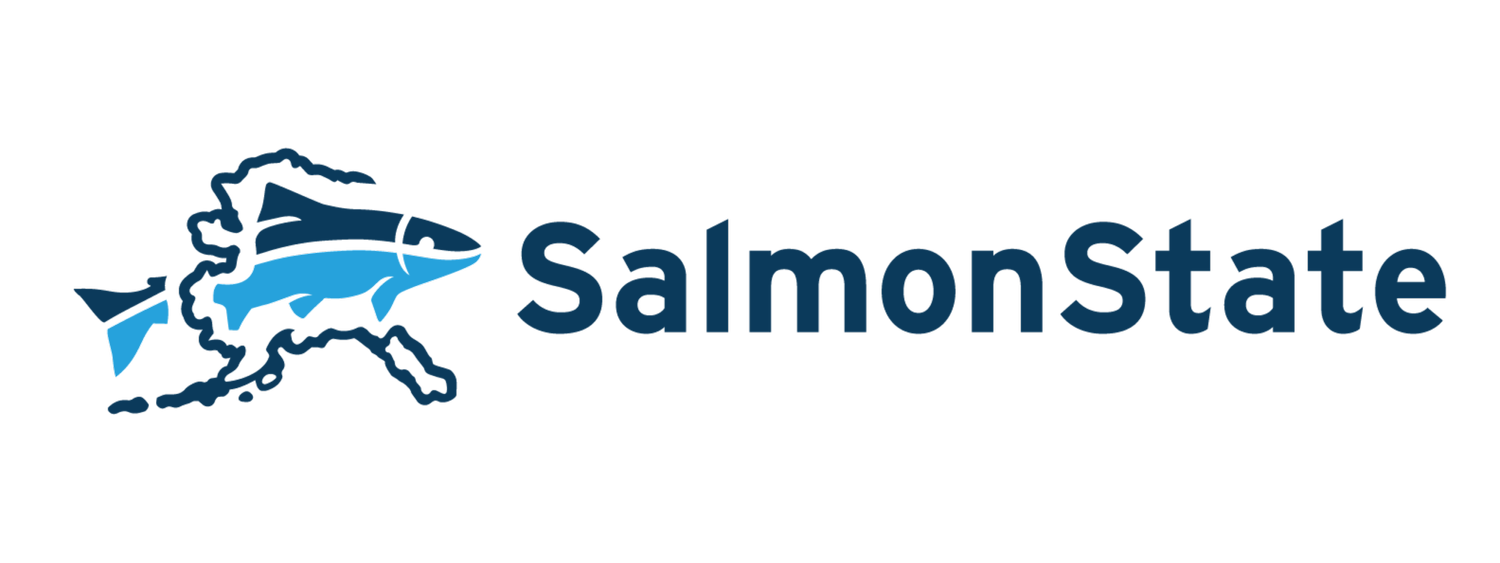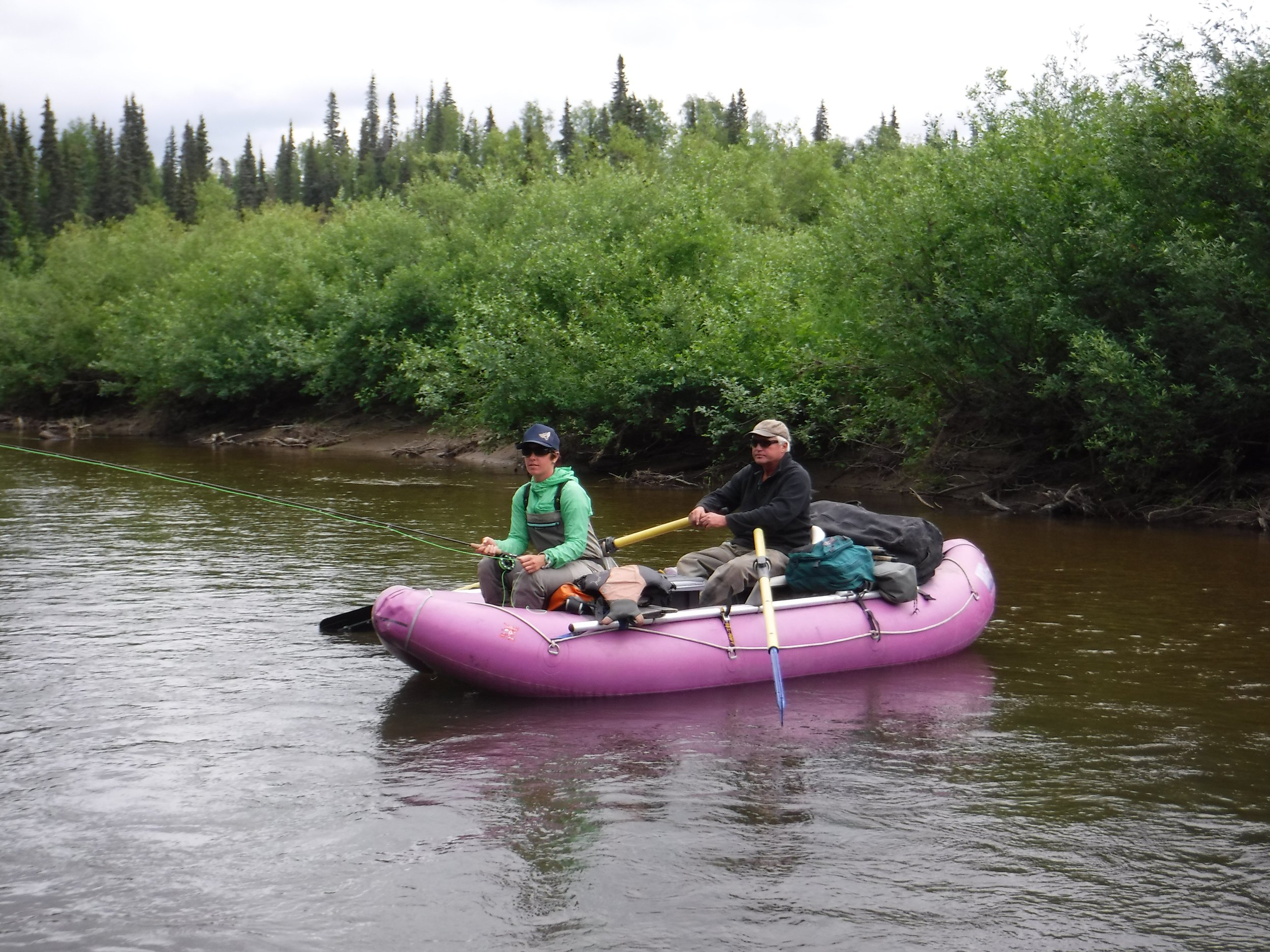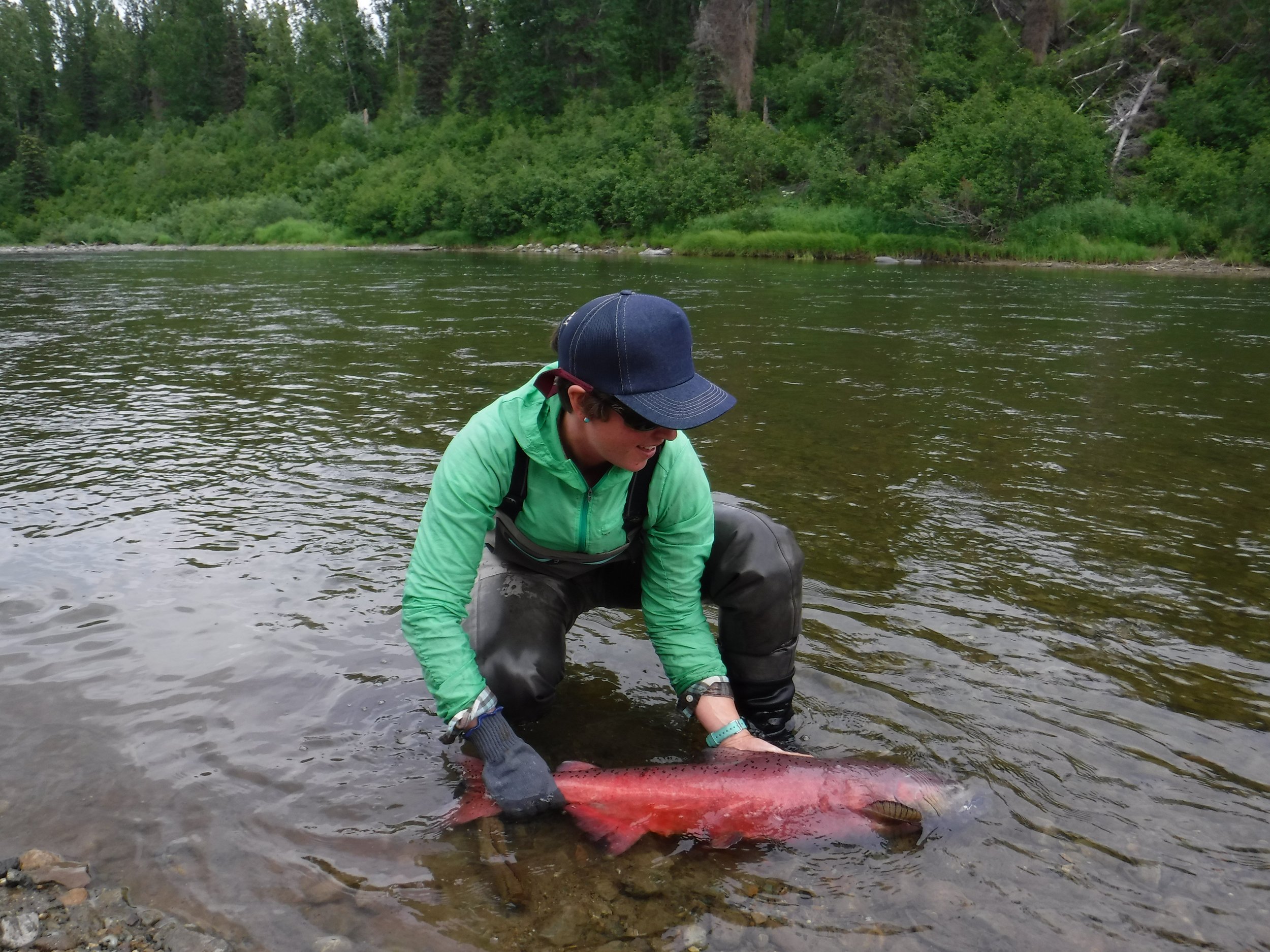Adam Cuthriell
“I grew up in Colorado, and my family exposed us to fishing, and camping. As I got older, I spent more time in the woods, and I was 14 when I started really getting into fly fishing. The moment I did it I was hooked — pardon the pun.
My buddies and I would cut school and ride our bikes down to a really cool trout river. The buddies I fished with at that time, we always heard about Alaska, Alaska, Alaska. We read magazine articles, and pre-internet, we watched fish movies and documentaries about Alaska. We thought ‘This is where it’s at. That is the last great place on Earth, the best place to fish.’ We would joke and say it would be so cool if we could start a guide service up in Alaska.
Later, I was going to school to be a lawyer. I was getting ready to take my LSATs, and I realized I didn’t want to spend my life in a courtroom. In my head, I made up this degree called Outdoor Recreation Leadership, and it actually turned out to be a real thing. I was on scholarship and went to school on my own dime, so I called my parents and said ‘I dropped out of UNC and enrolled into Colorado Mountain College. I’m going to get a degree in Outdoor Recreation Leadership. I want to be a fishing guide.’ And just dead silence from my parents. ‘You did what?’ They were supportive, though.
It’s been great ever since.”
- Adam Cuthriell, fly fisherman and owner, FishHound Expeditions
“Fly fishing has shaped who I am. Fly fishing, for those of us who are into it, is not a sport. It’s not a hobby. It’s part of who I am. It’s what you think about. What you dream about. I have dreams of steelheading — catching fish in your dreams. When you’re out there, the experience of the sheer joy. The sheer anger. It incites all ranges of emotions. It binds you, and becomes an addiction. The tug is the drug. When you have that pull and that experience out there, it just keeps you wanting more.”
- Adam Cuthriell, fly fisherman and owner, FishHound Expeditions
Adam with a steelhead in Yakutat, AK
“In 2011, I came up to Alaska for the first time. I had a good job guiding down in Colorado. A good life. I never thought I would leave Colorado. But I had always dreamed of Alaska, and at 30, I was like ‘If I don’t go now, I’m never going to go. So I’ll just go for a season or two and check it out.’ And I was here all of two seconds before I realized I was never going back to Colorado.
I met my wife a week after being here, and I knew I was going to marry her. We bought property, and we have a daughter. Alaska has been very good to me.
I’ll never forget my first experience flying out in a floatplane. Loading the plane up with the boats, and the gear, and all the multi-day stuff. Flying out, seeing wildlife. No roads. No mines. Just wild country. We landed on this lake, and there were brown bears circling around the lake fishing. You can see a zillion salmon in the river, everywhere. And I get dropped off because clients were coming in the next day, and I’m just there by myself, watching this massive boar just eating fish and dead salmon. First catch, I landed a 30-inch Arctic char. It was like ‘Oh my God. This is just like it is in the pictures.’
And still to this day, doing it for ten years, when you do this, the more you do it, the more you desire it, and crave it, and need it, to be a part of it. These places. And to be able to share that with folks.
I’m now an Alaska resident, and I would never live anywhere else. I live a lifestyle that only Alaska can offer.”
Adam Cuthriell, fly fisherman and owner, FishHound Expeditions
“At 35, I pulled the trigger and we started our own business up here in Alaska, FishHound Expeditions. It has been very good to us. We get to get out and see these wild, remote places. Get paid to take people out and show them how wonderful this state is.
In Colorado, where I grew up, hundreds of years of gold mining have left an absolute scar on the land, and done damage to rivers.
The fact that there aren’t roads and mines everywhere is something we need to fight to protect, and keep it that way, so I can have my daughter have the same experiences of flying out in a plane and seeing wild, open spaces. Moose. Caribou. Bears. Fish. This proposed West Su Access Road and mines would erase that. And that’s very sad.”
- Adam Cuthriell, fly fisherman and owner, FishHound Expeditions
“One of my first trips out there on the Tal was with a family that lives here in Alaska. The man’s daughter was getting into fly fishing. She was back from college, and he wanted to get this trip out there for his daughter to experience king fishing. Living here in Alaska, they had been to the Kenai, and other stuff that’s road accessible, but they had never gone out where there are no roads.
So we fly out there, land, get ‘em all rigged up. This was when kings were really good and you could see them everywhere. The joy that he had watching his daughter experience that, and catch a king, and be in the middle of nowhere — I still get emails from him. He reaches out to me about the experience of having that with his family. Being able to experience that. How it made them closer as a family as she was getting older. It still sticks out in my mind.”
Adam Cuthriell, fly fisherman and owner, FishHound Expeditions
“The West Su area, for it being relatively close and easily accessible — it’s just incredibly beautiful. And you don’t have to take two jet flights to get there. It’s right here, in our backyard. When you’re out there in the Talachulitna in particular — which is where they want to put a bridge, across this river that’s wild and free, home to all five species of Pacific salmon, great rainbow fishing, and just truly beautiful country. It’s still accessible by normal people who don’t own planes. Out in Western Alaska, you have to take a jet, you have to take two jet flights. But you can have that same feeling right here in our backyard.
It was just phenomenal my first time out there to the Tal. Get the clients rigged up, and they’re swinging through. In three or four casts, we’re tripled up on massive king salmon. That evening, once we get the clients fed, I get my spare rod. And first cast, I get a 50-pound king. It was just like — this is insane. Go get the trout fly rod, tie in a big old mouse pad, and lob that thing forty feet across the current. That mouse is ripping through, and this two foot rainbow just explodes on it.
The kings have gone down but they’re still there. Everything else is still flourishing. The trout is incredible. The grayling are incredible. Other salmon are still good. And if they do this road, it’s going to be gone.
Some people have been saying oh, the road would give access. But actually it would take away access, because you’re going to have to go farther. And the West Su area, it’s right here.
The quality of this fishery, for its relative ease of access, is unlike anything else out there.”
- Adam Cuthriell, fly fisherman and owner, FishHound Expeditions
“My hope is for us not to screw it up. Let nature do itself. As far as the West Su area is considered, from a fisheries management area, or fisheries biologist area, there are things we can do to help the kings. But for the region as a whole, let it be. The less we’re involved, the better nature can manage itself.
Get out there. See it. It’s relatively accessible. You can hike in it, boat in it, ski in it, snow machine in it. The rivers are our roads.
And if people got out and saw this amazing area that is essentially in their backyard I think they would think twice about what Nova Minerals is trying to do, and what AIDEA is trying to do. Here in the region, I’d say probably 80% of people are against the road, 20% for. And of that 20% that are for it, probably 10% think it’s going to be a public road.
The more time you spend in the West Susitna Valley, the more you know it needs to be protected. As she grows, I want my 22-month-old daughter to be able to experience how special Alaska is — not to hear about how great it once was.”
Adam Cuthriell, fly fisherman and owner, FishHound Expeditions













